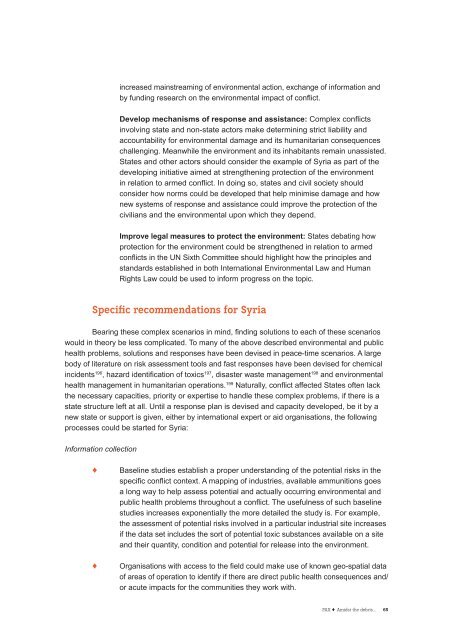Amidst the debris..
pax-report-amidst-the-debris-syria-web
pax-report-amidst-the-debris-syria-web
You also want an ePaper? Increase the reach of your titles
YUMPU automatically turns print PDFs into web optimized ePapers that Google loves.
increased mainstreaming of environmental action, exchange of information and<br />
by funding research on <strong>the</strong> environmental impact of conflict.<br />
Develop mechanisms of response and assistance: Complex conflicts<br />
involving state and non-state actors make determining strict liability and<br />
accountability for environmental damage and its humanitarian consequences<br />
challenging. Meanwhile <strong>the</strong> environment and its inhabitants remain unassisted.<br />
States and o<strong>the</strong>r actors should consider <strong>the</strong> example of Syria as part of <strong>the</strong><br />
developing initiative aimed at streng<strong>the</strong>ning protection of <strong>the</strong> environment<br />
in relation to armed conflict. In doing so, states and civil society should<br />
consider how norms could be developed that help minimise damage and how<br />
new systems of response and assistance could improve <strong>the</strong> protection of <strong>the</strong><br />
civilians and <strong>the</strong> environmental upon which <strong>the</strong>y depend.<br />
Improve legal measures to protect <strong>the</strong> environment: States debating how<br />
protection for <strong>the</strong> environment could be streng<strong>the</strong>ned in relation to armed<br />
conflicts in <strong>the</strong> UN Sixth Committee should highlight how <strong>the</strong> principles and<br />
standards established in both International Environmental Law and Human<br />
Rights Law could be used to inform progress on <strong>the</strong> topic.<br />
Specific recommendations for Syria<br />
Bearing <strong>the</strong>se complex scenarios in mind, finding solutions to each of <strong>the</strong>se scenarios<br />
would in <strong>the</strong>ory be less complicated. To many of <strong>the</strong> above described environmental and public<br />
health problems, solutions and responses have been devised in peace-time scenarios. A large<br />
body of literature on risk assessment tools and fast responses have been devised for chemical<br />
incidents 196 , hazard identification of toxics 197 , disaster waste management 198 and environmental<br />
health management in humanitarian operations. 199 Naturally, conflict affected States often lack<br />
<strong>the</strong> necessary capacities, priority or expertise to handle <strong>the</strong>se complex problems, if <strong>the</strong>re is a<br />
state structure left at all. Until a response plan is devised and capacity developed, be it by a<br />
new state or support is given, ei<strong>the</strong>r by international expert or aid organisations, <strong>the</strong> following<br />
processes could be started for Syria:<br />
Information collection<br />
! Baseline studies establish a proper understanding of <strong>the</strong> potential risks in <strong>the</strong><br />
specific conflict context. A mapping of industries, available ammunitions goes<br />
a long way to help assess potential and actually occurring environmental and<br />
public health problems throughout a conflict. The usefulness of such baseline<br />
studies increases exponentially <strong>the</strong> more detailed <strong>the</strong> study is. For example,<br />
<strong>the</strong> assessment of potential risks involved in a particular industrial site increases<br />
if <strong>the</strong> data set includes <strong>the</strong> sort of potential toxic substances available on a site<br />
and <strong>the</strong>ir quantity, condition and potential for release into <strong>the</strong> environment.<br />
! Organisations with access to <strong>the</strong> field could make use of known geo-spatial data<br />
of areas of operation to identify if <strong>the</strong>re are direct public health consequences and/<br />
or acute impacts for <strong>the</strong> communities <strong>the</strong>y work with.<br />
PAX ! <strong>Amidst</strong> <strong>the</strong> <strong>debris</strong>...<br />
65


